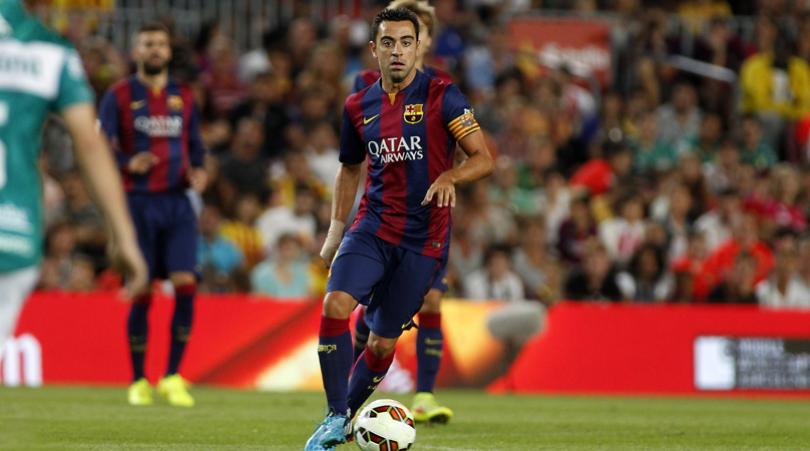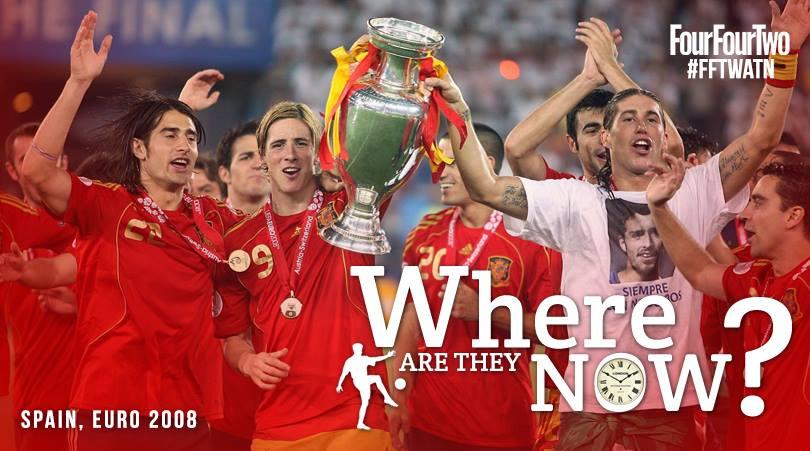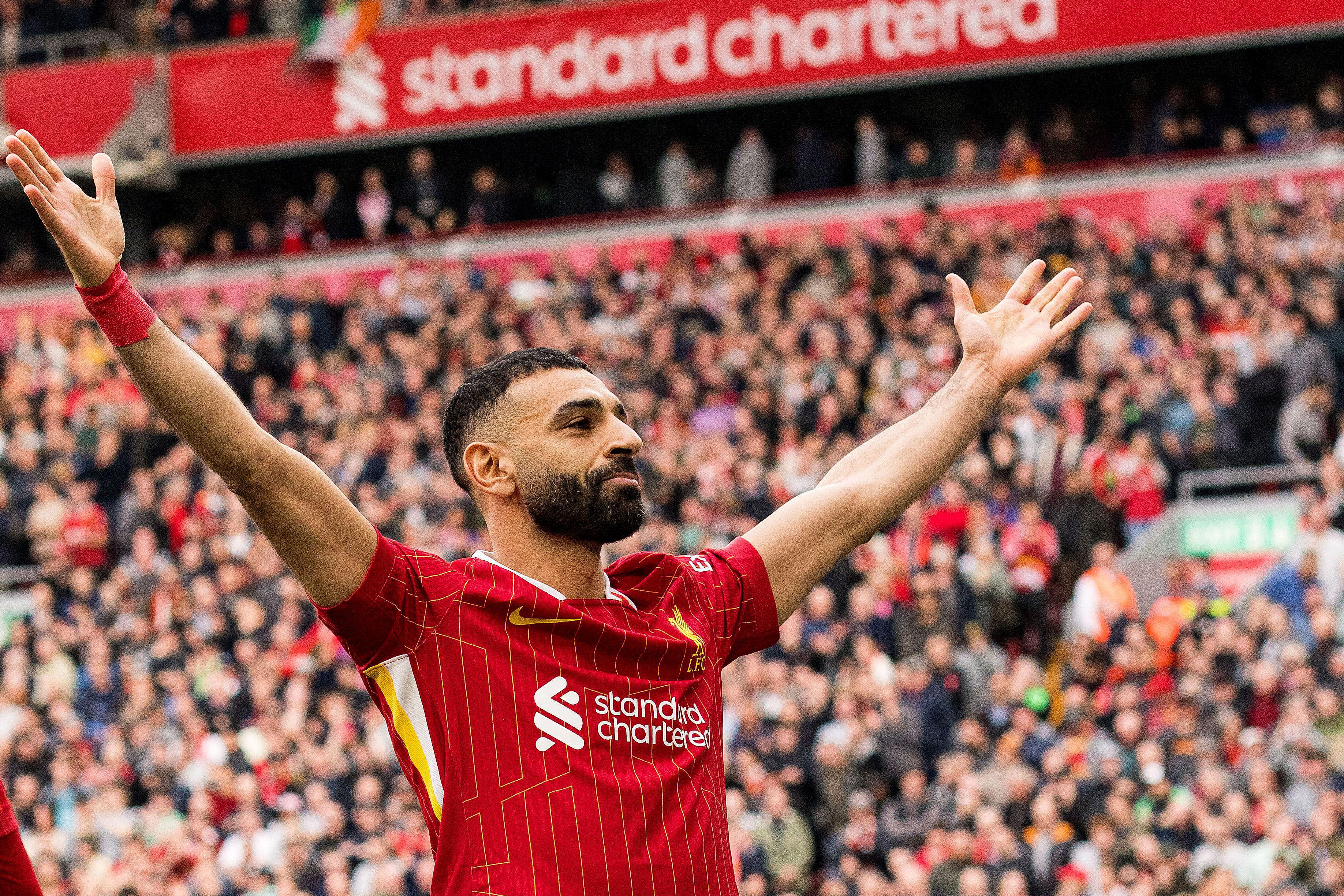The big interview: Xavi – inside the mind of a football genius
In the Middle East and out of sight, but definitely not off the radar, Xavi tells FourFourTwo of his love for the English game, his coaching masterplan and how he nearly left Barcelona at 19 (Issue: May 2016; Photography: Shamil Tanna)
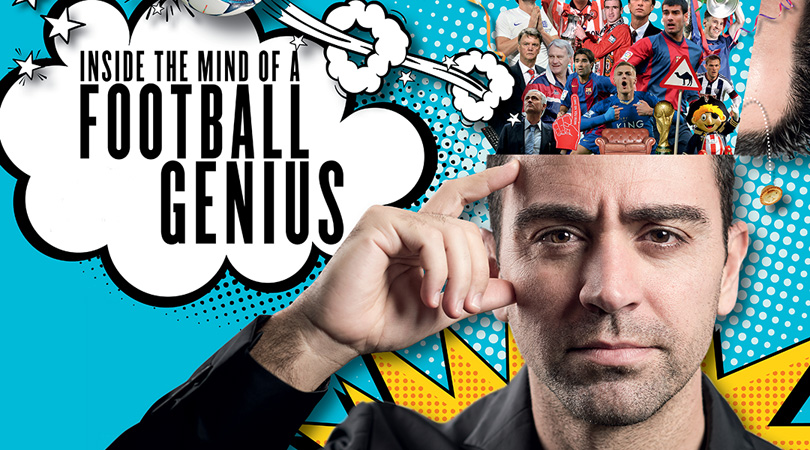
Xavi looks confused. It’s probably because he’s never seen a rattle before. “And people actually take these to games in England?” the perplexed playmaker asks. Then he screams, as a ratcheting cacophony fills the plush confines of the Torch Hotel in Doha, Qatar. “Bloody hell, that’s loud! It makes a much better noise than those damn vuvuzelas in South Africa.”
What you might be thinking, however, is why. Why the rattle? Why has FourFourTwo travelled more than 3,000 miles to the Middle East to interview a player who admits he’s in semi-retirement in Qatar?
In leaving Camp Nou last May, albeit as a Champions League-winning captain, Xavi also left European football behind. So is he still relevant? Put simply, yes. Xavi is footballing royalty; the key to a team that has dominated club football for a decade (and continues to do so in his absence) with a philosophy and style he embodies like nobody else. And it isn’t just Barcelona: Spain’s triumphs at three successive international tournaments would be unthinkable, even impossible, without this modest metronome of 5ft 7in.
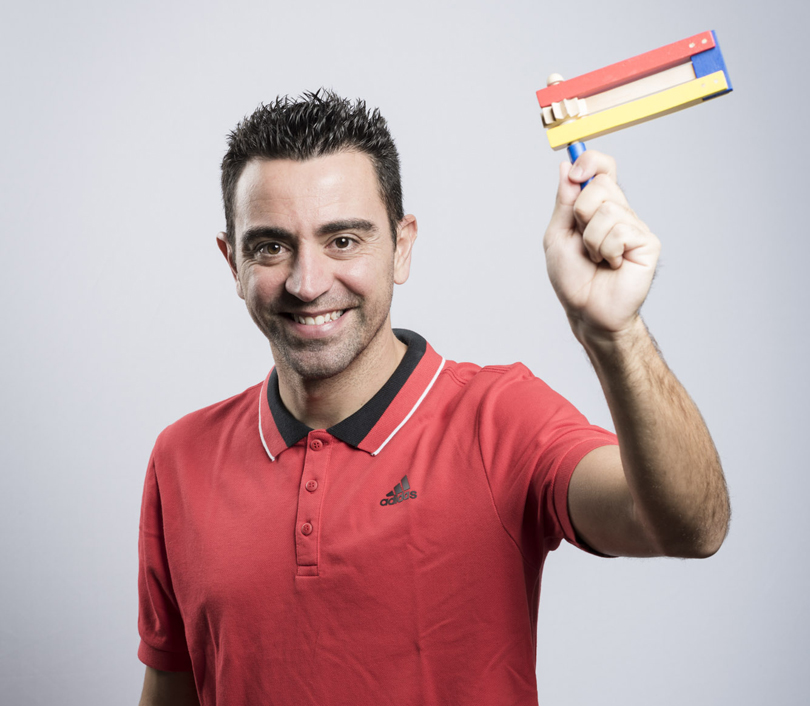
Yet there’s more to Xavier Hernandez Creus than 17 seasons with Barcelona, 28 major honours that include four Champions League titles, two European Championships and a World Cup, and being the poster boy for tiki-taka. Perhaps more than any other player, he feels football. And we want to find out what makes football’s deepest thinker and part-time historian tick.
If you want to know what’s next for football’s most prodigious brain, and exactly what he’s thinking, read on – especially if you’re Adam Lallana. Or Danny Drinkwater. Or, er, Craig Gardner.
English admiration
Did you see that volleyed backheel from Riyad Mahrez last night? Pffft, outrageous. I flicked over from La Liga just to watch it
Playing football has always been part of Xavi’s life, and you get the impression that talking about it has been as well. To this erudite 36-year-old, giving an interview represents an opportunity to talk about football, rather than the ordeal it is to many of today’s more cosseted stars. The lines between an informal chat over coffee and actual magazine interview are blurred.
Get FourFourTwo Newsletter
The best features, fun and footballing quizzes, straight to your inbox every week.
Greeting FFT in the hotel lobby with an almost embarrassed apology that an overrunning training session has delayed our meeting by less than half an hour, the first thing he does after enquiring about our journey (seat, comfy; chicken pasty, sweaty) is ask what England thinks about Leicester City’s title challenge.
“Did you see that volleyed backheel from Riyad Mahrez last night?” he asks, cooing over the Algerian’s outrageous assist in the Foxes’ 2-2 home draw with West Bromwich Albion. “Pffft, outrageous. I flicked over from La Liga just to watch it. It was an awesome free-kick from Craig Gardner, too.
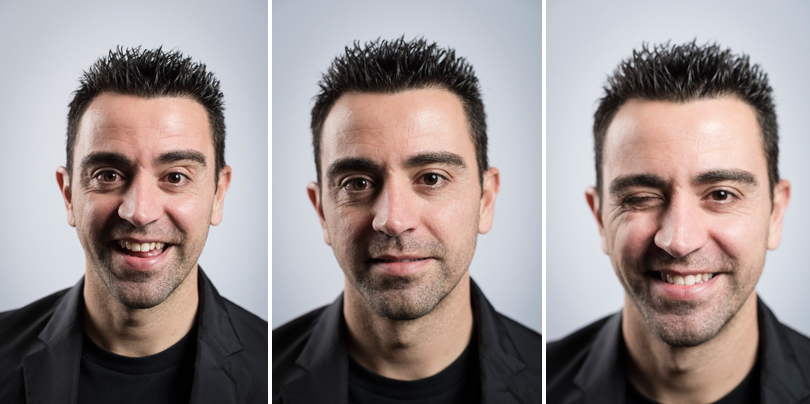
“Can you imagine if Leicester won the league? Let’s hope they don’t blow up and get ahead of themselves, because it’s easy for perceptions to change.
“The thing is, Leicester have a good team,” he continues, after being briefly mobbed by a Costa Rican youth team hunting autographs. “They’re very compact, Jamie Vardy is so quick on the break and Riyad Mahrez has great quality. N’Golo Kante is a phenomenon in midfield and Danny Drinkwater and Christian Fuchs, the left-back, are very solid, too. Robert Huth is huge at centre-back.”
This fixation on the sport was always inevitable, ever since his mother Maria Merce first met his father Joaquim over games of table football at her parents’ bar in the early 1970s. “Our house was fanatical about football,” recalls Xavi. “Me and my brothers used to collect stickers, especially around the World Cup.
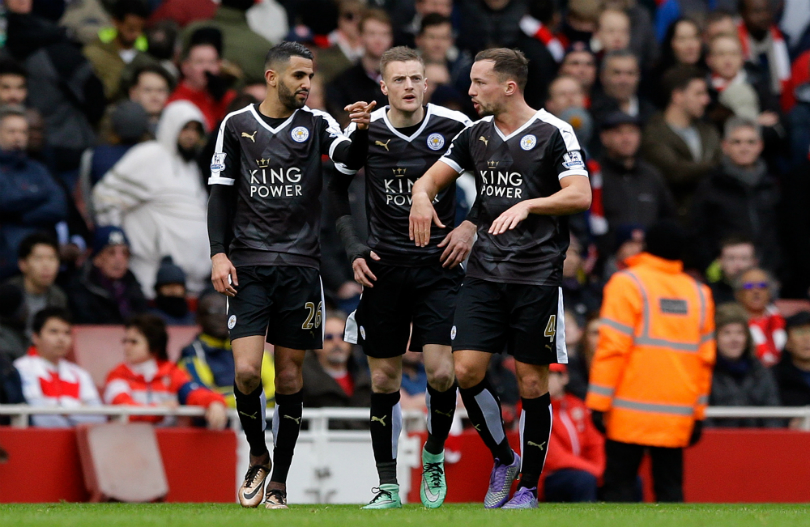
“My first memory is being taken to Camp Nou for the first time. I must have been about five, probably younger. It was an evening kick-off and everything was lit up. It was perfect. I went out of my mind seeing the pitch – totally delirious.”
With older brothers Oscar and Alex as well as sister Ariadna, Xavi and the family soon settled into life on Carrer de Galileu, a long, straight residential street in Terrassa, some 45 minutes north of downtown Barcelona. Not a day went by without little Xavier going out to join his brothers for a kickabout.
In Catalonia there used to be a half-hour programme every Monday where they’d show the best goals from the Premier League. Every week, Matt Le Tissier would be on the show. Every single week. I’m talking outrageous, sickening goals, too
One day, Joaquim went along to keep an eye on his five-year-old son. “He came up to me and said: ‘Why don’t you join in the attack? You’ll score’,” says Xavi, a smile enveloping his whole face. “Apparently, I responded: ‘But Dad, if I go up there, who’s left in defence to protect the keeper?’ I was already thinking tactically about football before I was at school!”
Not even Joaquim – himself a professional for Terrassa and Sabadell briefly, and later a coach – was spared the analytical treatment. “We used to sit in the crowd at his games, discussing what substitutions we’d make,” laughs Xavi. “Before each match, we’d analyse the team-sheets, saying: ‘Bloody hell, why’s he not playing?! He’s great and this guy’s average!’ It was our life.”
That passion extended to the front room’s designated ‘football couch’, from which the family “must have watched thousands of games”. It was here that Xavi’s love of English football developed, thanks to one man in particular.
“In Catalonia there used to be a half-hour programme every Monday where they’d show the best goals from the Premier League,” Xavi recalls, delivering his memory like a bedtime story to a child. “Every week, Matt Le Tissier would be on the show. Every single week. I’m talking outrageous, sickening goals, too: PUM, straight into the top corner; PAM, left-foot flick and then right over a defender to score against Newcastle; PUM, incredible free-kick.
“We used to say: ‘This guy, Le Tissier, is outrageous and he never goes to a big team. He stays at Southampton. It’s incredible. He could play for anyone!’ Our whole house was obsessed with him.”
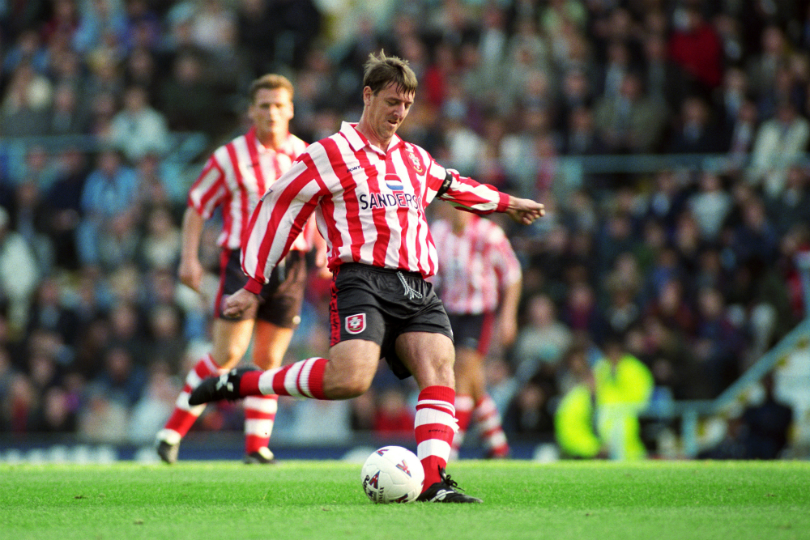
It wasn’t just Le Tissier, either, but English football in general.
“I remember watching John Barnes at Liverpool – wow, what a player he was – and also the Manchester United teams with David Beckham, the Nevilles, Ryan Giggs and Nicky Butt. In the same way that this Barcelona team is a reference point for Europe, Alex Ferguson’s Man United were worldwide references for years.
“Going further back, there was Bryan Robson, who I admired as a great fighter, and the legendary Eric Cantona. English football has always been in Spain’s retina. England breathes football in a way Spain doesn’t. In England, a footballer is like a god.
“The English game is an example of how to act, because you never cheat. You’re noble, even in defeat. Look at Bobby Robson as Barcelona coach: a true gentleman. No one has a bad word to say about him. You’re an example of the game’s traditions.”
The windscreen wiper
The deal to sign me was done before the trial, but my dad hadn’t told me anything. He just wanted me to play
Xavi’s parents worried about their young son’s petite physique, delaying his first Barcelona trial until July 1991, when he was 11. “I’ll never forget my dad driving me to the game,” Xavi recalls, smiling while tapping the side of his head. “He said: ‘Not many people get this opportunity, so just do your best. If it goes well, maybe they will sign you’. I was so nervous.
“I’d played most often just off a centre-forward. They played me as a pure No.9. We won a penalty and nobody else wanted it, and as I was the centre-forward I thought I should take it. I scored a hat-trick that day – the only one I’ve ever scored, I think. I was so happy.
“Then my dad told me the truth. The deal was already done for me to sign, but he hadn’t told me anything. He just wanted me to play.”
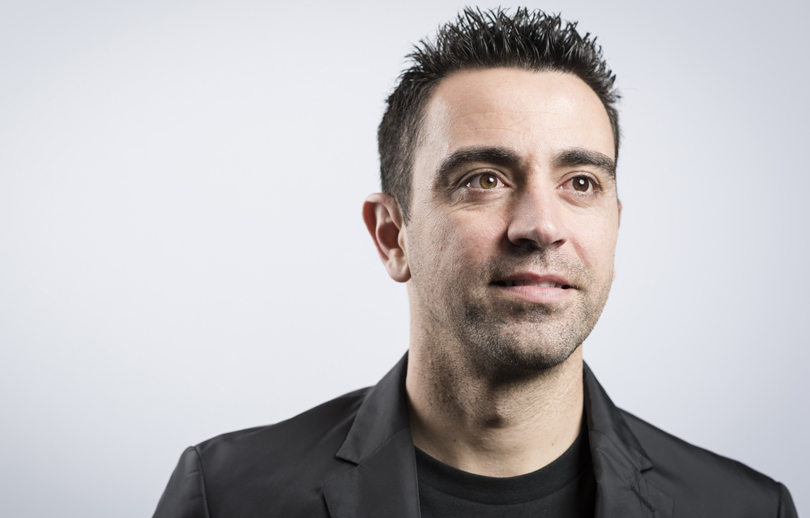
On the other team that day was a midfielder who was transfixed by what he saw. “No one could get the ball off him,” that lad said years later, by which point he was a defender. “I just thought: ‘They’re never going to sign me if there are kids this good!’”
It feels incongruous to hear Xavi talk about the mere possibility of playing in another European team – yet it very nearly happened
For the record, Carles Puyol didn’t have a bad career, either.
Commuting back to Terrassa every evening for dinner (his mum wouldn’t let him stay as a boarder at La Masia), Xavi would never wear his Barcelona tracksuit, so he could avoid the attention of his peers. While his friends would stay out late, he’d sit on the football couch with dad Joaquim or indulge his other passion of mushroom picking.
His first purchase with a youth-team pay packet of 4,000 pesetas (about £20) was a toaster, bought on Las Ramblas for his mum. By 1997, he was a Barcelona B regular. A year later he made his official first-team debut under Louis van Gaal, against Mallorca in the Spanish Supercopa, and scored in a 3-1 aggregate defeat.
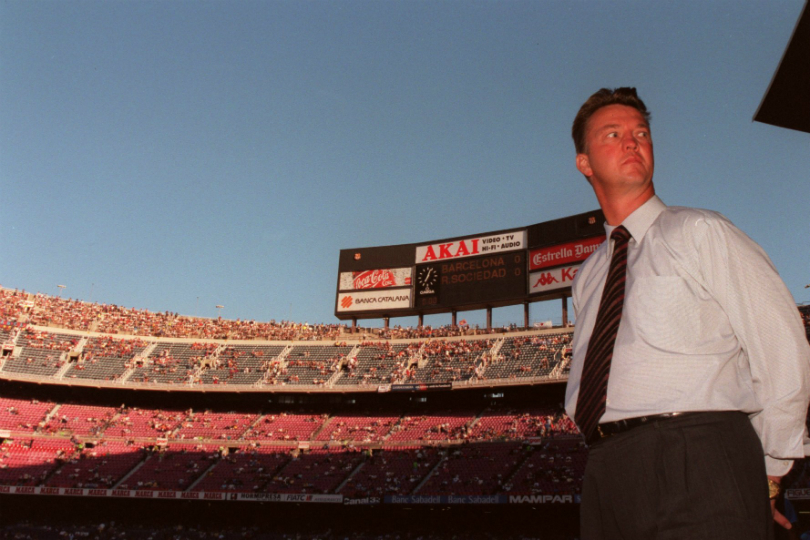
Despite a disastrous start, losing four consecutive games in December, Barcelona won the league, and Xavi was voted Spain’s breakthrough player. In April 1999, he excelled as Spain won the FIFA Under-20 World Cup in Nigeria.
Yet despite being the world’s most promising 19-year-old, Xavi was worried – worried about the comparisons to his idol Pep Guardiola, and even taking his hero’s place. Impressed by what he’d seen in Nigeria, Milan vice-president Adriano Galliani was prepared to pay Xavi’s release clause.
“Pep was 27 or 28 and in the best condition of his life,” Xavi recalls. “My dad said: ‘It’s better you go, because here they’ve got a ready-made team’. There didn’t seem to be a place in the team for me, while Milan said I’d play with Demetrio Albertini in midfield.”
It feels incongruous to hear Xavi talk about the mere possibility of playing in another European team – yet it very nearly happened. “My brothers said I should go, too,” he adds. “My mum was the only one who thought I should stay. Ultimately, it didn’t feel right. The legend goes that she stopped it, but the decision was mine.”
However, Xavi’s Camp Nou life would get worse before it got better. Van Gaal used him sparingly, and it took Guardiola’s departure for Brescia in 2001 for his diminutive successor to cement a first-team place. Yet Xavi was tacitly blamed for his idol saying goodbye. From that 1999 Liga title, Barcelona went six years without a trophy.
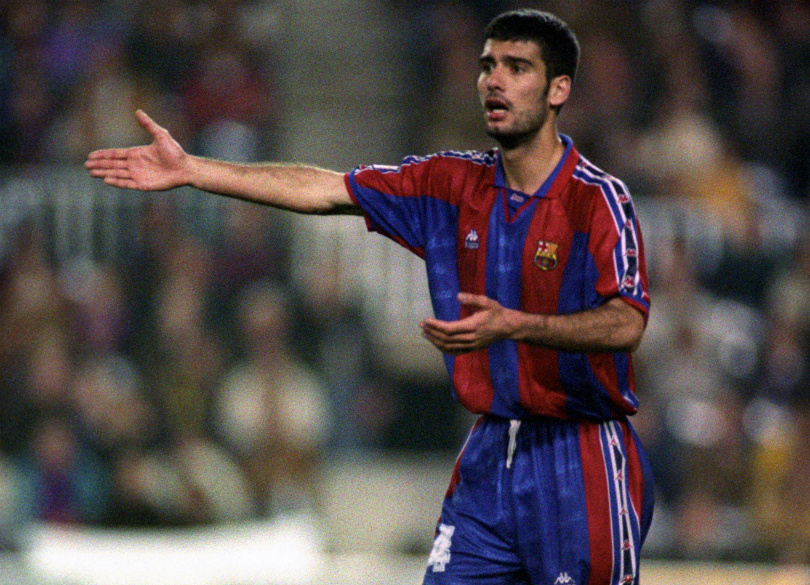
“Barcelona weren’t even in the running for any titles in that spell,” says Xavi, wearing a disappointed expression for the only time during our conversation. “The press looked for a scapegoat, and I was the best target. I was slow. I was ‘out of date’. I should be put down. Barcelona couldn’t play at Europe’s top level with me in midfield and had to look for taller, stronger players.
“We had a philosophy, but they wanted a change because of three or four years without a trophy. I understand criticism, but they were really strong. Some became personal, which affected my home life and hurt me a lot. It was like ‘Xavi has no merit’.”
There’s no comparison between the English football fan and the Spanish one: the respect in England is for the players, win or lose
The Spanish press had even dubbed Xavi Parabrisas, or ‘the windscreen wiper’, because supposedly all he ever did was pass the ball from side to side.
“You have two roads with critics: you get depressed or you fight,” he says, heartache replaced by iron-willed conviction. “I’m stubborn and pig-headed and this hardened me to prove what I can do. Bit by bit, I reached the top of the game. I’m very proud of that.”
At one point, Barcelona even sounded out potential suitors for his sale. What helped keep Xavi sane were European trips to England. He made his European debut – before his Liga bow – coming off the bench at Old Trafford in September 1998, to spark a love of English fandom that persists to the present day.
“There’s no comparison between the English football fan and the Spanish one: the respect there is for the players, win or lose,” says Xavi.
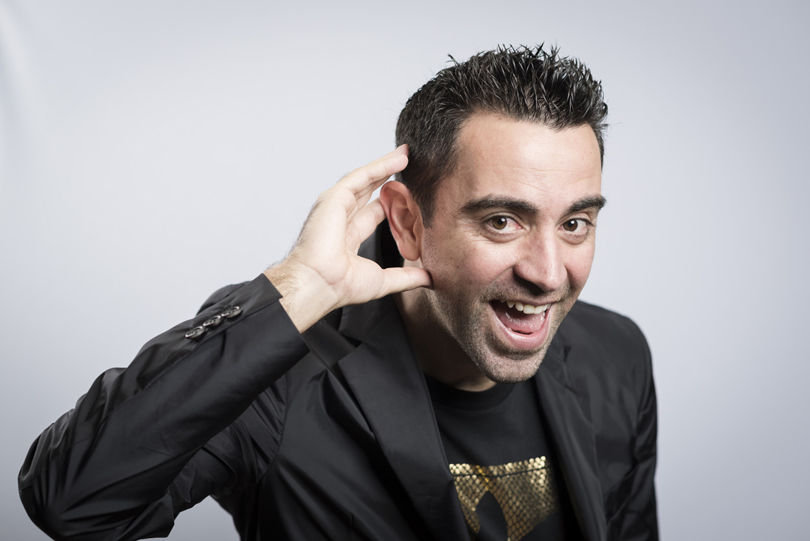
“I remember winning 3-1 at Anfield in November 2001, playing incredible football against Liverpool. The fans remained for the whole game and never stopped applauding their team. I mean, we couldn’t have played better, but in the 90th minute they were still applauding Liverpool. I couldn’t believe it. I was speechless.”
Warming to the theme, he skips forward to the present day. “I spoke to Juan Mata and David de Gea at the end of the season before last. Manchester United finished seventh, but after the final game at Old Trafford, the fans applauded the players off. That’s unthinkable in Spain. You’d have to flee to the dressing room as quickly as possible, because otherwise they’ll lynch you.
“It’s a family occasion. Son, father, grandfather, nephew – they all go together. It’s a spectacle you don’t get anywhere else; everyone has the shirt and feels part of the club. You’re the game’s inventors – the essence of football.”
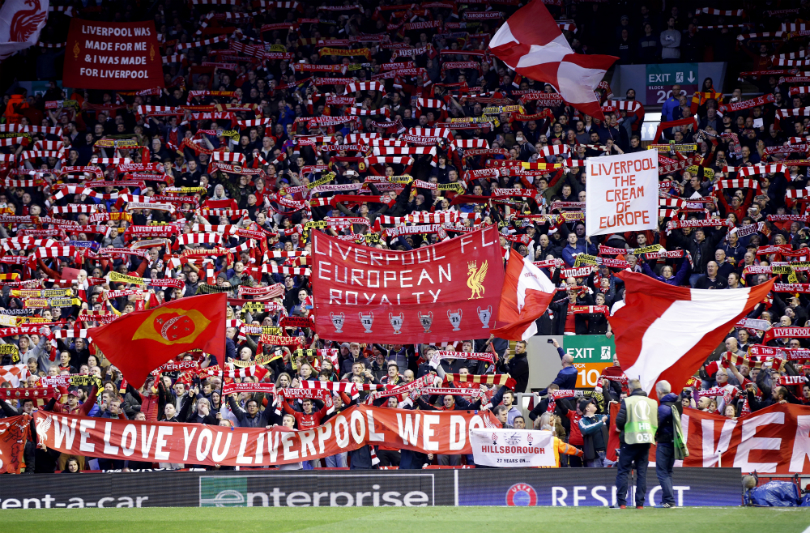
It took a change of manager for Xavi to feel part of Barcelona again. When Frank Rijkaard (left) arrived in 2003, along with new president Joan Laporta, Barcelona reconnected with the past. And the pass.
“It was like we’d returned to [Johan] Cruyff: a 4-3-3 with the focus on possession,” Xavi admits. “For four years, we’d bought players that were too young to make the difference in games. Then we signed Deco, Ronaldinho and Samuel Eto’o – players who were already internationals. We got back our dream. Ilusion.”
League runners-up to Rafa Benitez’s Valencia in Rijkaard’s first season, Barcelona then won consecutive domestic titles and the 2006 Champions League with trademark attacking football. Though Xavi remained on the bench for the latter through an untimely injury, he had been freed from his role as the lone defensive pivote, which had limited his creativity. Alongside Deco, and backed up by Edmilson or Thiago Motta, Xavi had licence to attack. To assist. To make a difference.
Read on for playing under Pep, and more...
Playing under Pep
The Barcelona romance had reignited, but it was in the summer of 2008 that it was definitively consummated as, following Euro 2008, Pep Guardiola returned to Xavi’s daily life, seven years after his Camp Nou exit as a player. Rijkaard’s final months had been defined by an increasingly unmotivated squad that had too many inflated egos. Not any more.
“Pep wrings you like an orange,” Xavi says, performing the action as he talks. “It’s fantastic when your coach does that. He was a master in every training session, meeting and team talk. He’s a total perfectionist and a born leader, who always takes you to the edge.”
I said to Pep: ‘Do you count on me for this season?’ He replied: ‘Xavi, I can’t imagine this team without you in it’. I didn’t need to hear anything else
It all began with a July chat between the former team-mates at the squad’s St Andrew’s training base in Scotland. Bayern Munich were sniffing around. The former Barcelona captain recalls: “I said to Pep: ‘Do you count on me for this season?’ He replied: ‘Xavi, I can’t imagine this team without you in it’. I didn’t need to hear anything else.
“I remember thinking after the first session in Scotland – always with the ball, great pressure, intensity from Pep – ‘things are going to go well for us’. I wouldn’t say I predicted that we’d go on to win six trophies in that first season, but he excited me. He transmits his ideas perfectly to you and has an incredible idea of how to play football – pretty much perfect.”
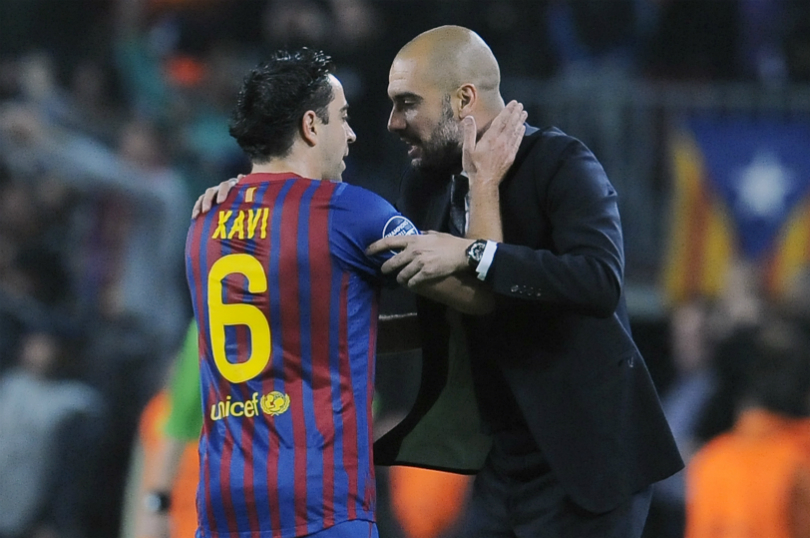
That 2008-09 season, Xavi scored nine goals and made 27 assists – the best figures of his career – as Barcelona swept all before them to an unprecedented sextuple of La Liga, Champions League, Copa del Rey, Supercopa, UEFA Super Cup and FIFA Club World Cup with a short, fast passing style that still endures.
“Nothing compares to that season and I don’t think anything ever will again,” says Xavi, this Doha hotel meeting room aglow with pride. “It’s the best football I’ve ever seen from a team. Incredible.
“We had practically 80 per cent of the ball in every game. We dominated matches from the first minute. We had 20-25 chances every game. We won everything. Six titles! We were almost unbeatable.
“Four years earlier, that was unthinkable – I’d been Barcelona’s problem, but now I was the key. Had my football changed? No chance – I was playing in the same way as when I was 11. The results had changed. That’s the effect.”
The trophies kept coming (title wins in 2010 and 2011 completed a Spanish league treble), with Xavi still the poster boy of the Guardiola revolution. In the 3-1 Champions League final win over Manchester United in 2011, he gave nothing short of a recital – later described by Alex Ferguson as “like being on a carousel” – in setting up the opening goal for Pedro.
“For me, the assist is more important than the goal,” begins Xavi. He would say that, of course, but the dizzying blur of hand signals that accompanies his mid-air sketch of that Wembley opener is proof of the difficulty of that pass.
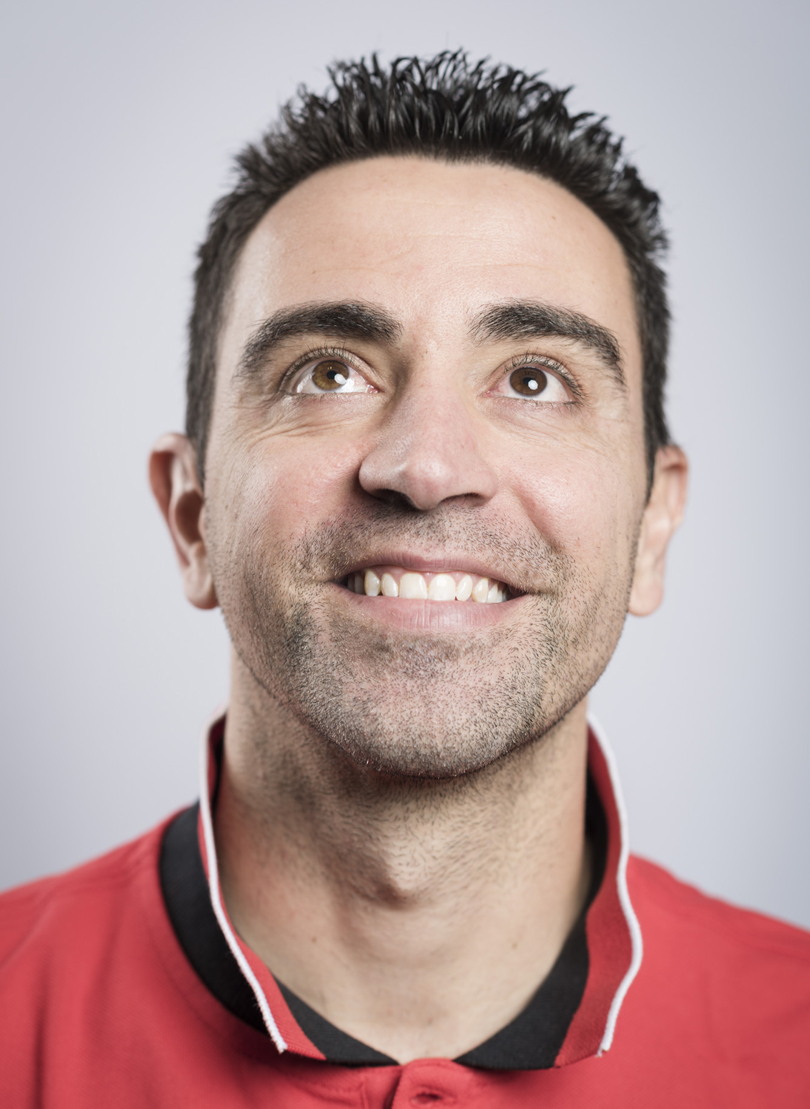
“I saw the United players running to pressurise me. Pedro lost his marker brilliantly. He came inside, stopped, then reversed out between two defenders to receive the ball. I’d already seen him, but I had to wait, wait, wait… then PUM, with the outside of the foot.
“Those three or four seconds between making the pass and Pedro scoring gave me goosebumps – pure elation. That through-ball inside, to cut out an entire defensive line in a major final, is as good as it gets. It was thrilling under Pep.”
Global domination
Luis was like an English ‘mister’ – actually, it was all about his mentality. He used to say: ‘You’re the best in the world’, poking us individually in the chest. ‘I’ve seen them all, and I don’t tell lies’
It’s to be expected that Xavi reserves such praise for Guardiola, his playing idol and the coach with whom he is most associated because of those four gluttonous seasons from 2008-09. But Guardiola benefited from having Xavi at the height of his considerable powers during that campaign. The reason was simple: Xavi’s other great coaching inspiration, Luis Aragones.
“Only under Pep and Luis have I ever come out of every team meeting or talk with the feeling of... I don’t know…” Xavi begins, before pausing to buy himself time to think, then breathing in heavily to puff out his chest and concluding: “...I suppose being so emotional and pumped up from what he said.
“I’ve learned a lot under the rest, but the sensation of taking something from every word they said? Just those two. Aragones changed everything for Spain.”
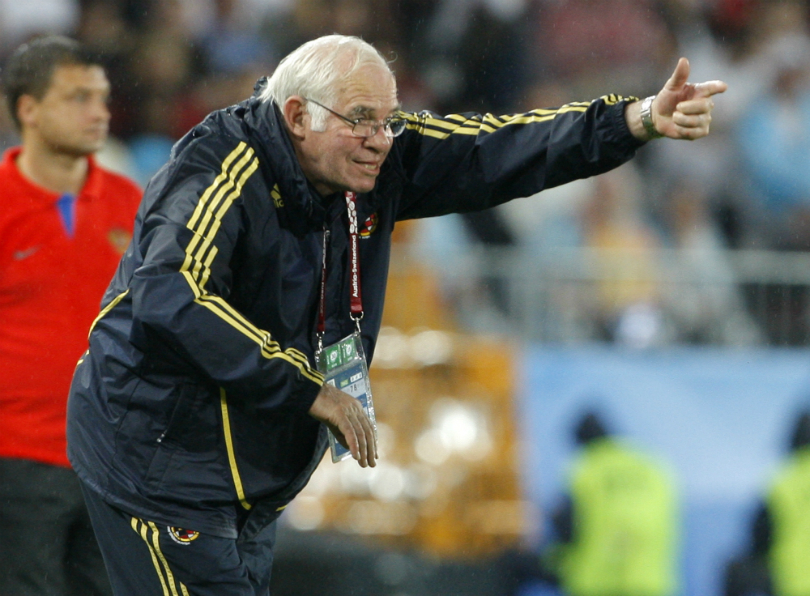
Aragones’ comments on Thierry Henry should never be airbrushed from history, but his four-year spell as Spain boss from 2004 laid the foundations for modern football’s greatest international side. Much like pre-Pep Barcelona, La Roja were struggling to turn a talented squad into consistent winners. Aragones made Xavi his conductor, frequently knocking on his door at 2am to tell him: “I want you to touch the ball more than anyone else”, and Spain won Euro 2008.
“Luis was like an English ‘mister’ – actually, it was all about his mentality,” Xavi recalls. “He used to say: ‘You’re the best in the world’, poking us individually in the chest. ‘I’ve seen them all, and I don’t tell lies’.”
Buoyed by a quarter-final shootout victory against Italy, Spain dispatched Russia in the last four, but the nerves returned for the final against Germany. Aragones (right) had one more plan up his sleeve.
“He had the ‘quality’ of forgetting people’s names,” Xavi smiles, trying and failing to stifle a laugh. “Just before going down the tunnel, he called us all around.
“He said: ‘Lads, I’ve got some news. Wallace hasn’t trained’. Er, who the hell’s Wallace, boss? ‘Wallace, the No.13, their playmaker’. You mean Ballack. ‘Pah, Wallace, Ballack – it’s all the same’. We all just fell about laughing and suddenly we were no longer nervous for the most important game in our careers.”
A relaxed Spain won 1-0, Xavi setting up Fernando Torres for the winner. It was at Euro 2008 that he became christened ‘Maki’, short for maquina, or ‘machine’.
“That tournament was the trampoline to me becoming a big name in European football – people woke up to me, I suppose,” says the pass master. “It’s understandable. I was 28 and I’d already played a lot of league and Champions League games, but the trophies hadn’t quite arrived. We weren’t references for the world game like we were about to become. Luis sent us on our orbit.”
I couldn’t sleep the night we lost to Switzerland in 2014, so I watched the whole game on repeat in my hotel room
The belief continued under Aragones’ successor, Vicente del Bosque, even after losing the first game of the World Cup two years later, 1-0 to Switzerland.
“I couldn’t sleep that night, so I watched the whole game on repeat in my hotel room,” recalls Xavi. “In the morning I went to see Del Bosque in his room. He looked at me and said: ‘Xavi, I’ve watched the game over and over and I don’t think we should change a thing’. I was so happy. ‘Boss’, I said, ‘it’s incredible we lost that game. It’s pure f**king chance they won. Just football. It’s an accident’. We carried on the same road, knowing we’d be criticised, but every game became a final.”
Honduras, Chile, Portugal, Paraguay, Germany and the Netherlands all succumbed en route to La Roja’s first World Cup, before Euro 2012 was won with embarrassing ease. By the 2014 World Cup, however, something had changed. All great teams’ spells atop football’s summit are cyclical, and by Brazil, Del Bosque’s side was on its last legs.
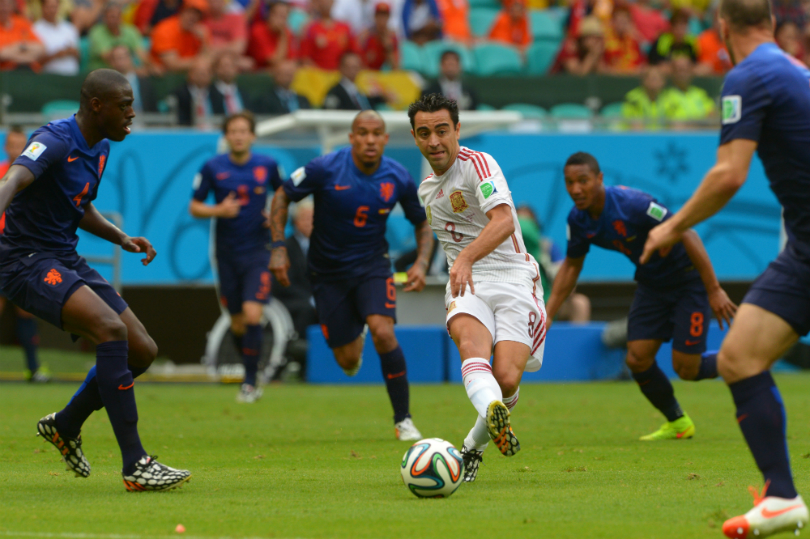
“Ultimately, we weren’t good enough,” admits Xavi, sounding resigned, perhaps accepting the hand dealt by fate. “It was tough having the Dutch first up, determined for revenge from the final four years earlier. We were poor and didn’t pressure the ball enough, but losing 5-1 was too much. That affected us.
“I’d never seen us play like that. We were making errors, both individually and as a team, that we hadn’t made in three tournaments together. We’d won practically every game to qualify, but against Chile in the next game it was different. Real pressure. They wanted revenge. And bang – 2-0, and that’s your World Cup.”
That premature exit weighed heavily on Xavi. He sensed the changing of the guard for both Spain (and promptly retired from international football) and Barcelona. Carles Puyol had hung up his boots, Victor Valdes had been discarded and, much like Guardiola as manager in 2012, Xavi felt tired.
He admits that in July 2014, “the deal to leave was practically signed”, before an old friend intervened in the name of dressing-room harmony.
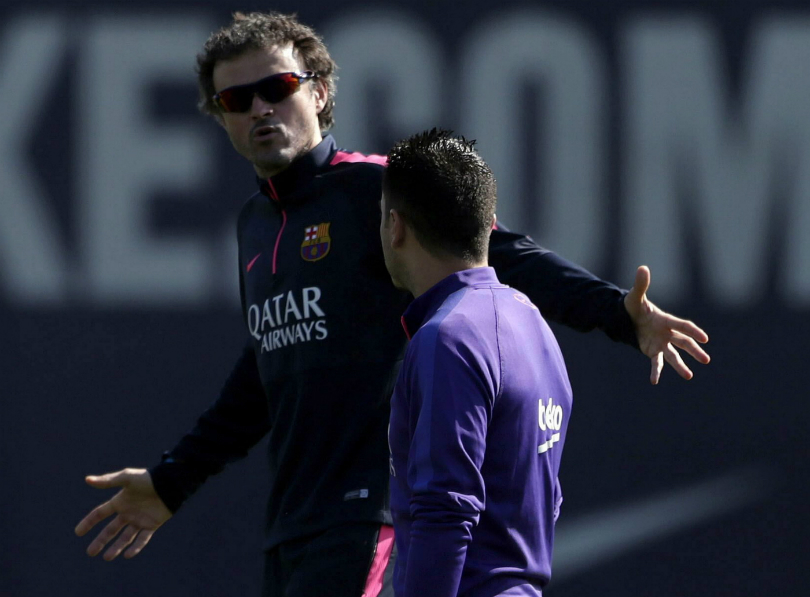
“I’ll forever be in Luis Enrique’s debt because he convinced me to stay,” admits Xavi of the then-incoming Barcelona boss, a team-mate 17 years previously. “He said to me: ‘Xavi, stay one more season. You can really help us. We’re going to win everything, I know it’. Life smiled on me that day.”
In January 2015, however, the dream was going sour. Barcelona trailed Real Madrid in the league amid rumours of squad in-fighting. “I was worried,” Xavi admits, puffing out his cheeks. “I knew I’d be leaving at the end of the season. We were in a bad way, not playing well, with problems hanging around the club. I was thinking: ‘Please, just give us one trophy – just one, to say goodbye to the fans, lifting a trophy as captain’.”
With Xavi as elder statesman knitting the squad together, while picking up minutes as the perfect controlling substitute to turn leads into victories, Barcelona’s season slid through the gears and into history.
“The stars aligned for me in those last three or four months,” he smiles, drifting off slightly as if recalling each of the 12 victories in Barcelona’s last 14 league games that secured his eighth league title, or every match en route to the Copa del Rey and Champions League finals.
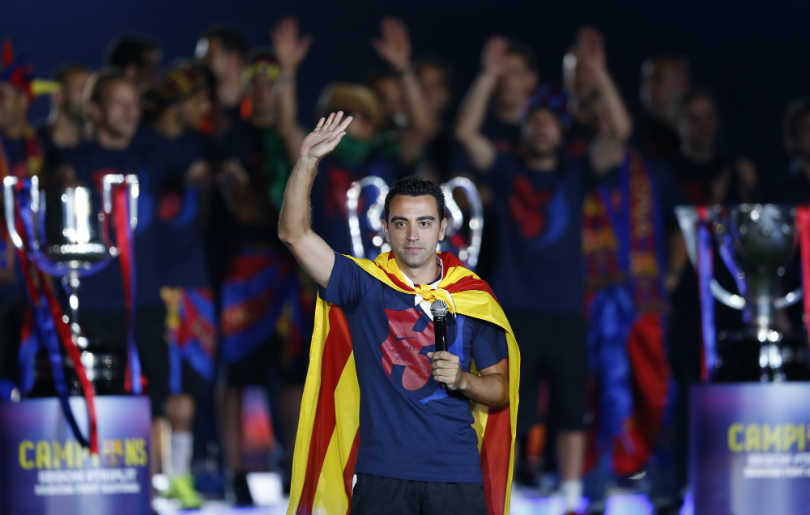
“I couldn’t believe the homage I got from Camp Nou in the last league match of the season against Deportivo La Coruna,” he recalls, his usually deep voice now crackling with emotion at the thought of the Catalan football cathedral’s mosaic that evening. “I got quite emotional.
“Then the Copa del Rey final was at home as well, and I lifted the trophy with my great friend Andres [Iniesta], the two of us in the presidential box.
“Best of all, though: your last act in a Barcelona shirt is to lift the Champions League trophy as captain? Pffft, there can be no better goodbye than that.”
What comes next? Allow the man himself to tell you...
Bossing back home
Sat some 3,000 miles away in his new Qatari base, Xavi smiles broadly at the memories, without a trace of regret.
So, what next for the most successful Spanish footballer of his generation? “Football’s still a hobby,” he says. “That’s the secret. If I didn’t have training every day, I’d go and play five-a-side with my mates.
I’m here for football and I want to leave a legacy for the 2022 World Cup
“Listen: I’m playing in Qatar. It’s a professional league – you can’t just coast through games because everyone is well-prepared physically and the teams are evenly matched – but it’s not like Europe. Tactically, it’s not that well developed. But I love playing football and Al Sadd play a possession game, so I touch the ball over 100 times per game.
“I’m here for football and I want to leave a legacy for the 2022 World Cup.”
Life in the Middle East is good, barring the traffic (“an absolute nightmare”). After spending much of the previous two days in horn-honking taxis that crawl to their destination, FFT knows how he feels.
In January, Xavi’s wife Nuria gave birth to daughter Asia. “Being a father has changed my life in the best way imaginable – she’s incredible,” says Xavi. The family live on
Doha’s outskirts, in the same house that Raul inhabited when he played for Al Sadd between 2012 and 2014. Just down the road is the Aspire Academy, where Xavi’s next chapter has already begun. Working with the Under-23 team, the 36-year-old is determined to put the best football brain of his generation to good use.
“I have no doubts,” he says, staring straight and true at FFT. “I want to stay in football, being close to the pitch. I would hate being stuck in an office.
“I want to do something properly or not at all. My ultimate objective is to coach Barcelona. I’m not hiding that. I want to work again for that house I consider a home.”
Whenever I have 10 minutes to myself, bang – the football goes on the TV. My wife knows that, and she hates football
While studying for the necessary coaching badges to do exactly that, Xavi will retreat to his natural habitat: studying football.
“Whenever I have 10 minutes to myself, bang – the football goes on the TV. My wife knows that, and she hates football,” he laughs. “For example, tonight at 10pm, I’ll put on La Liga and keep an eye on the Premier League games, too. I’ll study the line-ups, and who’s scored, on my phone.
“The Premier League’s new television rights deal is great because everyone earns pretty much the same. In Spain that doesn’t happen. The difference between Real Madrid, Barcelona and the rest is too much. No one can match the big two.
“But in England, it’s not so. For example, Stoke City, with good players like Ibrahim Afellay, Bojan, Marko Arnautovic and Xherdan Shaqiri, are able to beat Chelsea no problem, because the budget is more or less the same as England’s big teams.”
Xavi even takes in Championship games: “I’ve watched Middlesbrough a fair bit because of the former Espanyol striker, Cristhian Stuani, and obviously the coach, Aitor Karanka, who has had them playing great football. I’ve seen a bit of Brentford, too.
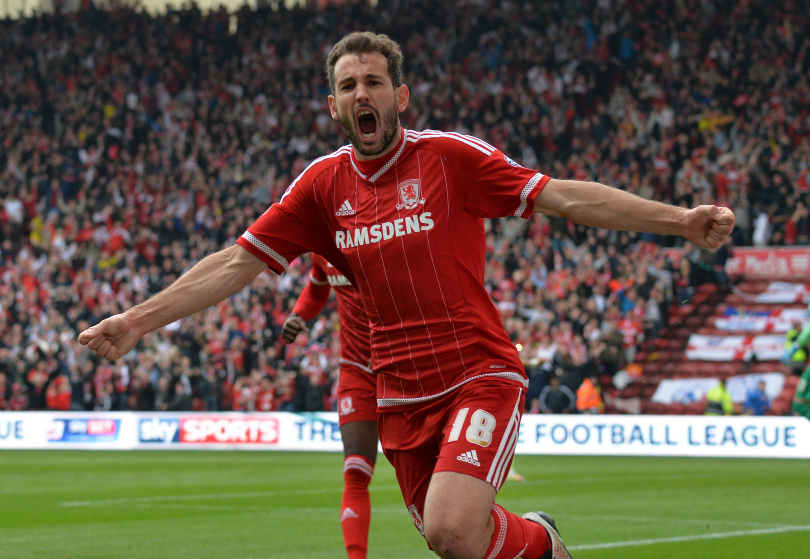
“Lower-league football in England is another world. The other day, near where I live, a little English kid came up to me, asking for an autograph. I asked him who he supported, expecting to hear Arsenal, Manchester United, Liverpool, Tottenham... ‘I’m a Sheffield United fan’, he said. They’re in League One. League One?! And this kid doesn’t care about any other team than Sheffield United. Fantastic.”
Nothing, however, stirs the Xavi blood quite like his beloved Barcelona, who dominate the new football couch.
“Barcelona are at another level,” he says. “They don’t let the opposition breathe. And those three upfront… Wow. They can score from anywhere. I’ve never seen three players of such a high level in the same team. Never. Messi, Suarez and Neymar are spectacular.
“But the whole team is, too. Sergio Busquets does everything in midfield, and yet he’s never in the running for the Ballon d’Or. Come on – that’s scandalous. Do people not watch football at all? Do you not understand that football isn’t about dribbling?”
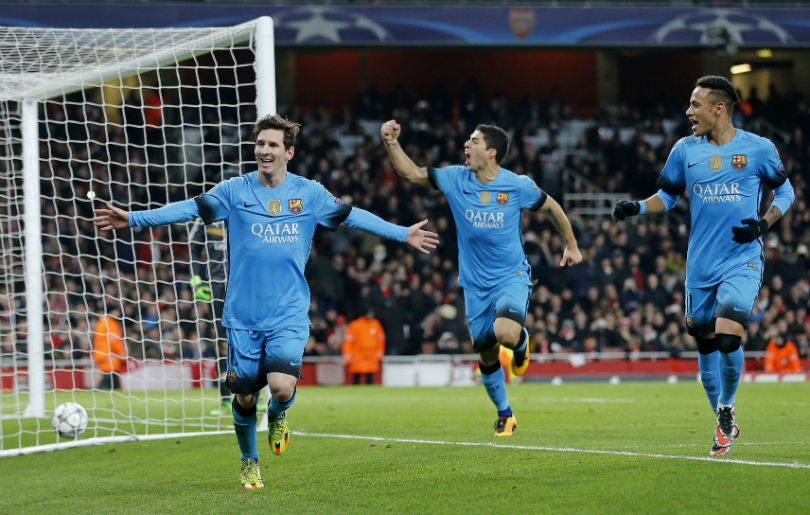
The passion with which Xavi talks about the game’s minutiae is all-consuming. He cares for football’s past, present and future, and even offers up improvements.
“The first thing I’d do is create a set of rules for the quality of the playing surface,” he spits at one point, becoming ever more vociferous by outlining his plan with a thump of his left hand onto an open palm. “Look, if I played tennis against Novak Djokovic, he’d definitely beat me because he’s better than me. What can I do to stand some chance of winning? Go round his side of the net and dig up the court.
“Well, the equivalent is allowed in football. Teams intentionally worsen a pitch against better opposition. It’s 2016 and that can’t be. It’s bad for your knees and ankles – and what about the spectacle?”
Coming here, improving our players
Foreign coaches going to England there has undoubtedly helped, taking the typically English game – direct, long ball, second ball, typical No.9 to bring down the ball, crosses into the box – and improved it
The time creeps towards 10pm and football-watching and late-night parenting await him at home, but you get the sense Xavi could talk all night as our conversation again sways back to English football.
“The standard is much higher now,” he says. “In the past, there wasn’t as much natural talent – just Rooney, Lampard, Gerrard, and the rest were physical.
“Now you’ve got Raheem Sterling; the guy [Adam] Lallana, quality; Eric Dier, quality; [Dele] Alli, quality; [Jack] Wilshere, quality. Then you have natural goalscorers – Vardy, [Harry] Kane – plus Rooney and physical guys at the back. I think England could be an outside bet at the Euros.
“Foreign coaches going over there has undoubtedly helped, taking the typically English game – direct, long ball, second ball, typical No.9 to bring down the ball, crosses into the box – and improved it.
“Mauricio Pochettino is doing a brilliant job at Tottenham with that model. Pep going to Manchester City will raise the league’s quality – he’s a game-changer. Jurgen Klopp is a phenomenon. Jose Mourinho, who they say is going to Manchester United, is the same.
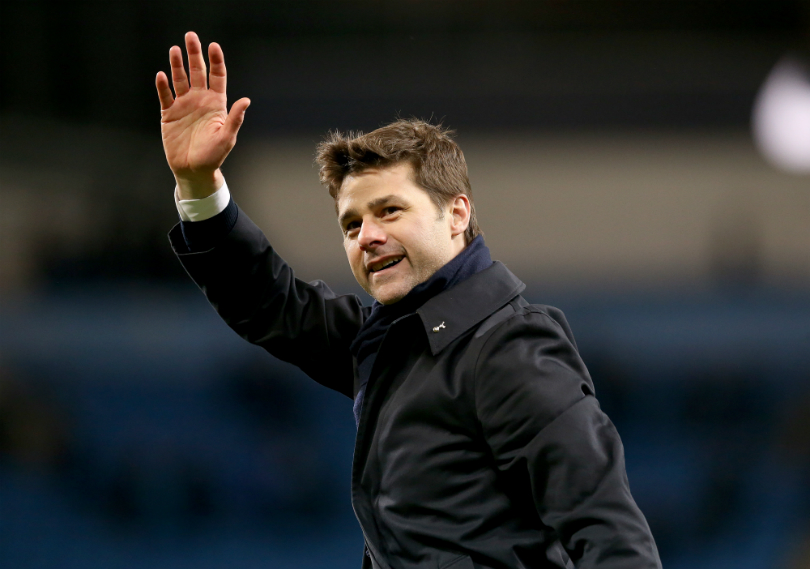
“I remember when he came to coach us at Barça B as Louis van Gaal’s assistant. You could see he wanted to be a coach, though I didn’t think he’d go so far in the game. He’s a demanding winner, even if I do disagree with the way he wants to play football – it’s all about transitions and counter-attacks, not keeping the ball.”
If the last hour in the company of this most cerebral of footballers has taught FFT anything, it’s that this is what Xavi is determined to leave by way of legacy. All that matters is the ball. And talent.
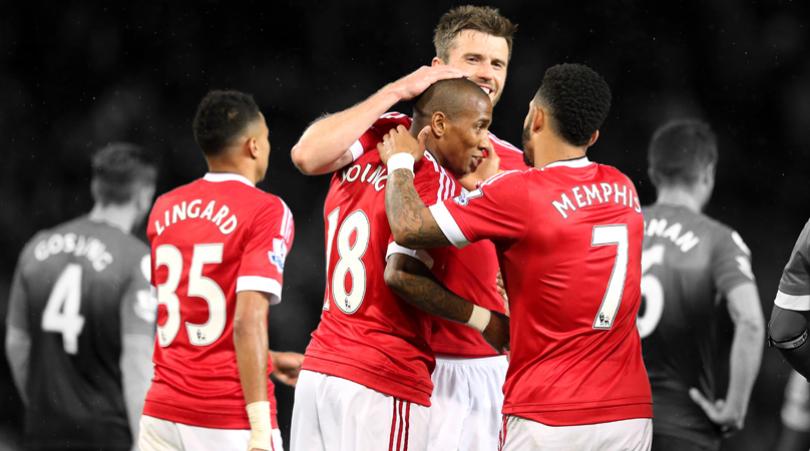
“Your physique is important, of course, and more so in every era, it seems, but it’s the most talented players who make the difference,” he says. “I’m a romantic and I hope my career, which has been all about the pass, has shown that.
“What does Cristiano Ronaldo have? Talent to score. Neymar? Talent to dribble. Messi? The most talented player in history. The day that stops, that’s the end of spectacle in football. We should pack up and go to live by the sea, because what’s the point?”
With that, hands are shaken, but just before Xavi heads home to enjoy an evening’s La Liga and Premier League football (tonight it will include a man-of-the-match Adam Lallana display at home to Manchester City) there’s just about time for a FourFourTwo first. We came to Qatar with a present.
“Bloody hell!” Xavi screams, barely able to contain himself as we present English football’s No.1 fan with a signed Matt Le Tissier shirt we had lying around the office. “Can I really keep this? It’s incredible. Do you know him?!”
This cover feature originally appeared in the May 2016 issue of FourFourTwo. Subscribe! • Photography: Shamil Tanna
Andrew Murray is a freelance journalist, who regularly contributes to both the FourFourTwo magazine and website. Formerly a senior staff writer at FFT and a fluent Spanish speaker, he has interviewed major names such as Virgil van Dijk, Mohamed Salah, Sergio Aguero and Xavi. He was also named PPA New Consumer Journalist of the Year 2015.
